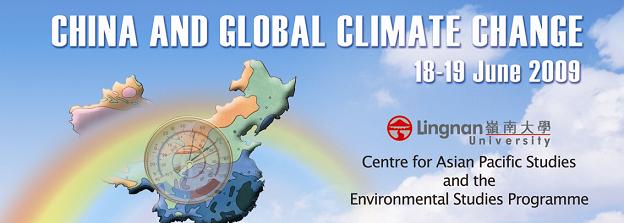
Event Title
Conference on China and Global Climate Change : Reconciling International Fairness and Protection of the Atmospheric Commons
Location
AM308, Lingnan University
Start Date
18-6-2009 4:00 PM
End Date
18-6-2009 5:00 PM
Language
English
Description
What must the European Union do to make China commit to binding regulations on greenhouse gases? China has been one of the major veto players with regard to binding rules on carbon emissions in context of the Kyoto Protocol and the negotiations of a Post-Kyoto arrangement. And yet, China is one of the largest polluters in this respect. Because of its economic growth rates, emissions are likely to rise in the future. It is therefore necessary to find viable solutions that encourage China to limit and finally reduce greenhouse gas emissions. In contrast, the EU has internationally showed leadership in climate change policy. The EU is often considered as a normative power, i.e. having the ideational power to define what can be perceived ‘normal’ on the international level.
The question is whether the bilateral cooperation between the EU and China on climate issues can help to (a) promote norms and values and generate an increased awareness of climate change both on the political and societal level, (b) establish comprehensive environmental policy frameworks on a bilateral basis with a positive impact on national policy making and (c) positively influence environmental policy making on the international level such as the Post-Kyoto negotiations on climate change.
This paper seeks to set a research agenda for the exploration of the EU’s normative power with regard to climate change policy in China. As the main research objective will be to find out about the acceptance and adaptation of norms related to climate change, the concept of normative power and the discussion on norm diffusion and norm localization will be central to this analysis. Furthermore, this study will be embedded in the debate on ‘new bilateralism’, thus concentrating on new actors, agendas and instruments in bilateral relations.
Document Type
Presentation
Recommended Citation
Carrapatoso, A. (2009). EU-China relations on climate change policies and the role of bilateral cooperation for a global climate change regime. In China and global climate change: Proceedings of the conference held at Lingnan University, Hong Kong, 18-19 June 2009 (pp. 253-268). Centre for Asian Pacific Studies and the Environmental Studies Programme, Lingnan University, Hong Kong.
Included in
EU-China relations on climate change policies and the role of bilateral cooperation for a global climate change regime
AM308, Lingnan University
What must the European Union do to make China commit to binding regulations on greenhouse gases? China has been one of the major veto players with regard to binding rules on carbon emissions in context of the Kyoto Protocol and the negotiations of a Post-Kyoto arrangement. And yet, China is one of the largest polluters in this respect. Because of its economic growth rates, emissions are likely to rise in the future. It is therefore necessary to find viable solutions that encourage China to limit and finally reduce greenhouse gas emissions. In contrast, the EU has internationally showed leadership in climate change policy. The EU is often considered as a normative power, i.e. having the ideational power to define what can be perceived ‘normal’ on the international level.
The question is whether the bilateral cooperation between the EU and China on climate issues can help to (a) promote norms and values and generate an increased awareness of climate change both on the political and societal level, (b) establish comprehensive environmental policy frameworks on a bilateral basis with a positive impact on national policy making and (c) positively influence environmental policy making on the international level such as the Post-Kyoto negotiations on climate change.
This paper seeks to set a research agenda for the exploration of the EU’s normative power with regard to climate change policy in China. As the main research objective will be to find out about the acceptance and adaptation of norms related to climate change, the concept of normative power and the discussion on norm diffusion and norm localization will be central to this analysis. Furthermore, this study will be embedded in the debate on ‘new bilateralism’, thus concentrating on new actors, agendas and instruments in bilateral relations.

